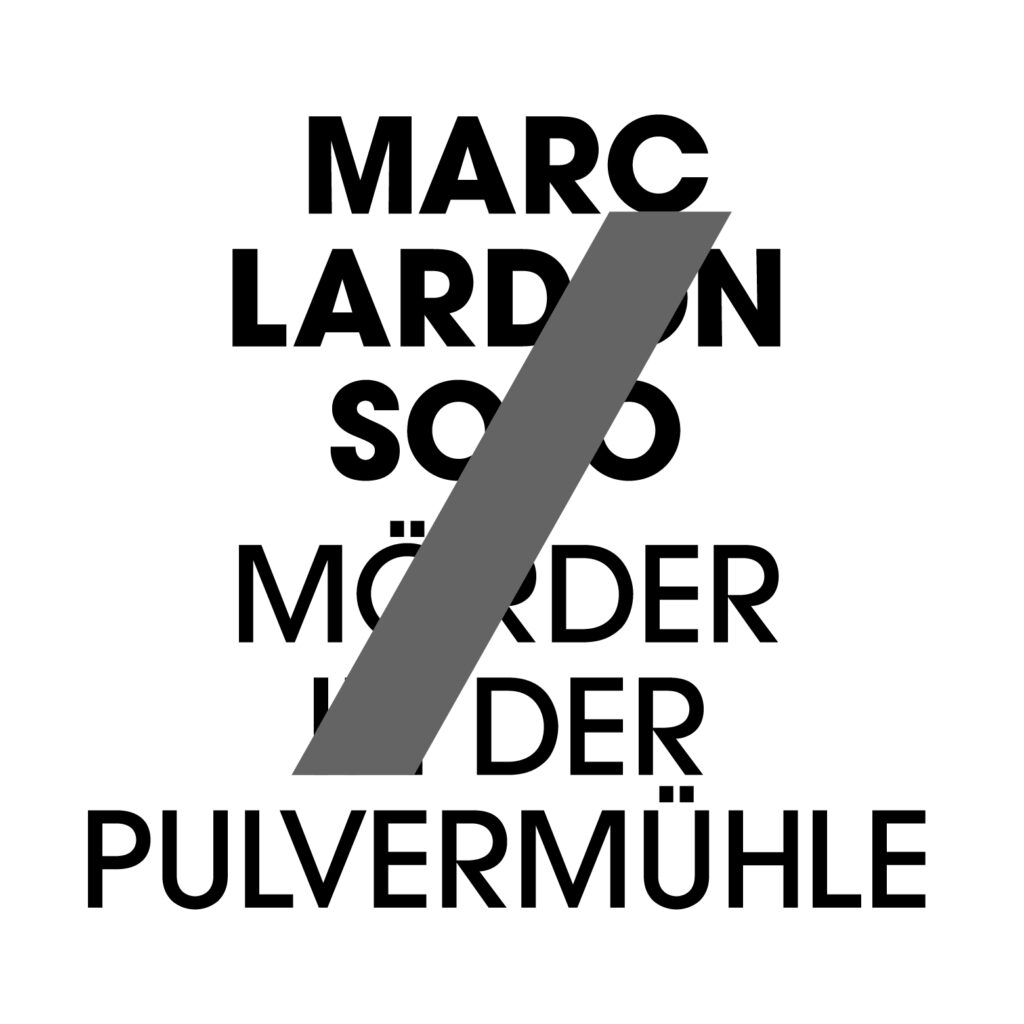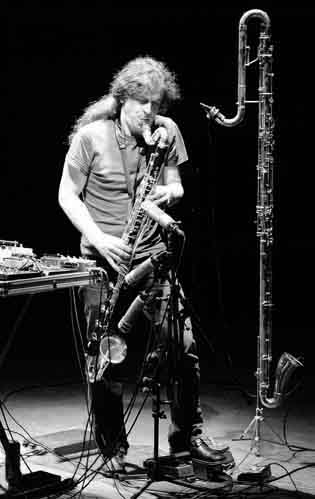
Mörder in der Pulvermühle – Marc Lardon
deszpot #001
Limited edition of 250 Vinyl and 150 CDs
This vinyl-production keeps the record(s) of the bass clarinetist, contra bass clarinetist and electronic musician Marc Lardon playing in and with an extraordinary room: a huge ancient industrial space in the Gestle-Arela, Chur. The pieces are the essence of two days of plain recording, just with four room-microphones. The six improvised and completely live played pieces are so precise that they often remind the listener of detailed composed and written music. The interaction between the heavy acoustic sounds of the clarinets and the pure analog electronic equipment, the pure acoustic interplay of action and reaction between the musician and the room with its huge resonance create a unique world of sounds, musical images and stories. The pieces root in New Music but they are played with the roughness and riff structure of metal or rock. Marc Lardon creates his own music style somewhere between powerful and playful, between figurative and abstract, between the room and himself.
The limited vinyledition consists of a heavy, 180 gram vinyl. The master was cutted by Frank Heierli at centraldubs-studio, Berne. The cover is designed by Miriam Affolter (Atelier Komma, Biel) and printed by handcraft and in serigraphy at the Druckerei Reitschule in Berne. If you buy a vinyl we will send you enclosed the digital CD. Each of the 250 copies is serially numbered.
The CD-version of this release is packed in a hand stamped cover. Each of the 150 copies is unique and serially numbered.
Tracklist:
01 Monsieur Verdoux
02 Hattori Hanzo
03 Nachtvolk
04 Traum
05 Black Mamba
06 Epilog

Marc Lardon, Photo © Theo Gstoehl
Marc Lardon lives in Grisons. He is a bass clarinet and contra bass clarinet player and uses analog electronic increments for his instruments. He has studied under Harry Sparnaay in Amsterdam. Marc Lardon is interested and engaged in the fields of improvisation and contemporary written music: As interpreter he works with musicians like Cäcilia Schüeli, David Sontòn, the Ensemble Ö or as solo player. As a conceptual musician he created numerous live theater music pieces. As improviser he plays solo as Mörder, with Andreas Glauser as Splitter, with Daniel Sailer as plutoniumtransport and furthermore with musicians like Hans Koch, Peter Conradin Zumthor or Christian Müller.
Actual works:
Solo
Splitter, duo with Andreas Glauser
plutoniumtransport, duo with Daniel Sailer
Kontrabach, duo programme with Daniel Sailer
Whale Belly, trio with Andreas Glauser and Christian Bucher
Lardon–Sartorius, duo with Julian Sartorius
Reviews/Rezeption
«… Wenn Lardon da seine Stücke Kill Bill-inspiriert ‹Hattori Hanzo› und ‹Black Mamba› nennt, ‹Nachtvolk›, Traum› und ‹Monsieur Verdoux›, darf man vermuten, dass ihm die Prämisse «Mord ist die logische Erweiterung des Kapitalismus» geläufig ist, und ihm rollende Köpfen vorschweben. Mit nachhallenden knurrigen Stakkatos, Stimmverdoppelungen und urigen Abschattungen verwandelt sich Lardon in ein Sogenanntes Linksradikales (Einmann)-Blasorchester, mit immer wilder knurrender und brüllender Gunpowderplotstimmung. Mit keckernden und schnarrenden Kontrabassstößen lässt er eine Mineurbrigade gegen die Churer Paläste marschieren und ihre Stollen bohren. Die Nacht ist erfüllt von Gebrodel und Gejaule, zu dem sich ein Koloss hüpfend auf den Weg macht, um Ärsche zu versohlen. Lardon macht mit Gusto den Dicken, aber einen Dicken, der gerne tanzt und singt und von was Schönerem träumt als von Investitionen und Renditen. Prokofjewsk geht er Wölfe und Blutsauger jagen, lange sorgsam pirschend, dann aber in einen mörderischen Kampf verstrickt (‹Black Mamba›). Der ‹Epilog› stupst, lustvoll röhrend, Löcher in die dicke Luft. Kurzum, ein Mords Spaß!»
Rigo Dittmann, Bad Alchemy 76
«… Der «Kriminaltango» von Hazy Osterwald spielte in der Taverne. Lardon schickt den Mörder in die Pulvermühle. Wir sollten uns den Tatort nicht als pittoreskes Häuschen am Waldrand vorstellen. Schon eher als eine industrielle Kathedrale, ein unterirdisches Kraftwerk, vielleicht auch das Innere einer Staumauer. Es muss ein riesiger Hohlraum sein, in dem sich diese Sound-Ereignisse abspielen und selbst Mörder das Fürchten lehren. […] Die sechs Stücke leben zuallerest von der Wucht des Sounds, der in seiner Unheimlichkeit und schieren Kraft fassbar gemacht wird. […] Er [Marc Lardon] kann die Klänge aufeinandertürmen, er kann sie malträtieren und wüst verzerren, er kann sie schreddern und die einzelnen Teile wie Geschosse durch die Räume jagen. Aber Lardon sucht nicht den Exzess. Er schreitet Schritt um Schritt voran. Es ist eine dunkle und heftige Welt, die sich hier Bahn bricht, wenn auch keine chaotische oder gar ausweglose. Man kann der Bestie ins Auge schauen. Lardons Musik wirkt wie eine Katharsis im Schlund all dessen, was im gesellschaftlichen und politischen Alltag an sogenannter Normalität so herumtost. Der «Kriminaltango» von 1958 ist ein biederes Liedchen dagegen. Die Beklemmung ist heute greller geworden. Und ist mitten unter uns.»
Pirmin Bosshard, Südostschweiz
«And here’s the other inaugural release for Deszpot. Marc Lardon on bass clarinet, contrabass clarinet, and electronics. Solo pieces with live electronics and some looping. Lardon has found simple yet original sonic environments. And his pieces are often simple yet they brilliantly draw the most out of these environments. Worth comparing to Alexandre St-Onge’s recent solo album of bass guitar and signal processing – same kind of approach, with much more affected and unnatural-sounding results.»
François Couture, Monsieur Délire
«Également paru sur le label suisse Deszpot, Mörder in der Pulvermühle est un solo de Marc Lardon pour clarinette basse, contrebasse et électronique analogique. Il s’agit de six pièces enregistrées dans une immense usine désaffectée à la réverbération colossale. Des improvisations qui paraissent complètement composées dans la mesure où il s’agit de pièces polyphoniques d’une précision assez rare. Des pièces qui évoquent des marches symphoniques, mais aussi le rock progressif et RIO pour l’aspect martial et binaire de certains passages. Marc Lardon superpose les couches électroniques, acoustiques et la réverbération, et il en résulte un son unifié, lourd, saturé, très proche du rock (on croirait même entendre des riffs de death à certains moments). Les sources sonores sont souvent indistinctes, car la musique de Lardon a quelque chose de massif et lourd, de gras et pesant, malgré l’aspect polyphonique qui laisserait supposer une claire distinction des couches de son. de manière plus générale, c’est assez intense et plutôt prenant et enivrant – c’est assez plaisant en somme. Une musique qui plaira surement aux fans de Colin Stetson (pour l’utilisation spectaculaire de l’instrument, ainsi que pour les boucles et les riffs proches du rock et du post-rock), mais aussi, j’imagine, aux amateurs de RIO, peut-être plus qu’aux aficionados de musique improvisée…»
Julien Héraud, improv sphere
«First release from the new Swiss label Deszpot, based in Biel. A label that is devoted to the experimental music scene in Biel. Lardon plays bass clarinet and contra bass clarinet plus analogue electronics. He studied with Harry Sparnaay, a famous Dutch bass clarinet player who experimented with electronics already in the 70s. On the one hand Lardon performs modern composed music, on the other he is into producing music for theatre and as an improvisor under the name of Mörder. He has a duo with Andreas Glauser called Splitter and another one with Daniel Sailer, and played furthermore with Christian Müller, Hans Koch, etc. ‹Mörder in the Pulvermühle› presents Lardon as a solo improviser. But let’s concentrate on his solo album. The music breathes a dark an teutonic atmosphere, as if one is entering the underworld. But despite the undeniable heaviness of this music, it is also of a very specific beauty. He creates sonic spaces comparable – a little bit – with territories Art Zoyd and Frohmader often visit. Acoustical sounds and electronic treatments are effectively intertwined. The pieces fascinate more because of particular archaic sound world Lardon successfully creates, then the compositional complexity. (DM)»
Dolf Mulder, Vital Weekly No.871
